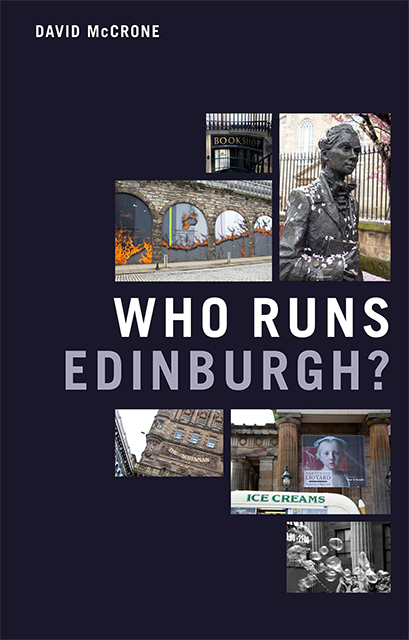Book contents
- Frontmatter
- List of Contents
- Figures and Tables
- Preface
- 1 Who Runs Edinburgh?
- 2 Politics in Edinburgh
- 3 Winners and Losers: The Political Economy of Edinburgh
- 4 Treading Angels: Edinburgh and its Festivals
- 5 Are You One of Us? Status in the City
- 6 What School did You Go To? Education and Status in Edinburgh
- 7 Enlightened City: Cultural Power and University Life
- 8 Developing Edinburgh: Pies in the Sky, Holes in the Ground
- 9 Lost in Leith: Accounting for Edinburgh’s Trams
- 10 Does Anyone Really Run Edinburgh?
- Bibliography
- Index
10 - Does Anyone Really Run Edinburgh?
Published online by Cambridge University Press: 25 October 2023
- Frontmatter
- List of Contents
- Figures and Tables
- Preface
- 1 Who Runs Edinburgh?
- 2 Politics in Edinburgh
- 3 Winners and Losers: The Political Economy of Edinburgh
- 4 Treading Angels: Edinburgh and its Festivals
- 5 Are You One of Us? Status in the City
- 6 What School did You Go To? Education and Status in Edinburgh
- 7 Enlightened City: Cultural Power and University Life
- 8 Developing Edinburgh: Pies in the Sky, Holes in the Ground
- 9 Lost in Leith: Accounting for Edinburgh’s Trams
- 10 Does Anyone Really Run Edinburgh?
- Bibliography
- Index
Summary
In Winter she really comes into her own,
the New Town grey under a watery sun,
its whinstone setts ghosting broughams and sedan chairs, silk
dresses swishing,
the Old Town, once haunt of cut-purses
and men of letters; today's imbalance
more east-windy
and west-endy than ever. Formerly prim spinster, then dowdy
dowager, now part princess,
part hen party hostess, at heart she possesses a sliver of ice …
(‘Ice Maiden’, by Stewart Conn)What kind of place is this Edinburgh? Why does it invite questions about who runs it? Consider that last question. On the face of it, it would seem obvious –after all, it seems a city with secrets; in Abercrombie's words, ‘an ancient and venerated shrine’ –but who wants to live in a shrine? Behind the façade, if that's what it is, there seems to be another story, or, rather, stories. Indeed, perhaps it is best to think that there are multiple Edinburghs behind Stewart Conn's sliver of ice.
ECOLOGY OF GAMES
Let us return to Norton Long's notion of a city as an ecology of games. Perceptively, Long observed: ‘It is psychologically tempting to envision the local territorial system as a group with a governing “they”’ (Long 1958: 252). In other words, we are expecting to find, and none more so than in Edinburgh, a close nexus of powerful people who make the key decisions. Why Edinburgh? There would seem a prima facie case for there being a governing ‘they’. After all, the city was run by a peculiar breed of parochial politics for a century, from the 1870s to the 1970s. Readers of this book will recall the hegemony of the so-called Progressive party until its collapse in the final quarter of the twentieth century. Furthermore, it drew disproportionately on the local business class, merchants in the main, who held the city's affairs firmly in its grip. They dominated its economy, its politics and its culture, its schools, even though it was left to James Bridie, a Glaswegian, to remark that ‘Edinburgh prides itself in not being interested in anything at all’ (quoted in Miller 1996: 3–4). One might argue that such insouciance was a front. Bridie's may seem a harsh judgement in a city of festivals as well as its accolade as a UNESCO World Heritage Site.
- Type
- Chapter
- Information
- Who Runs Edinburgh? , pp. 248 - 278Publisher: Edinburgh University PressPrint publication year: 2022



